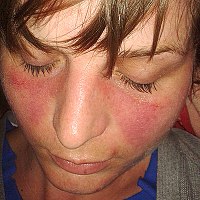
Photo from wikipedia
The protein profile of dormant Mtb obtained after the gradual acidification of Mtb culture was studied to find antigenic proteins for humans that are expressed by M. tuberculosis (Mtb) cells… Click to show full abstract
The protein profile of dormant Mtb obtained after the gradual acidification of Mtb culture was studied to find antigenic proteins for humans that are expressed by M. tuberculosis (Mtb) cells in vitro under conditions close to the situation of persistence in vivo. According to 2D electrophoresis, a significant diversity of proteins in dormant cells was found. However, the representation of individual proteins in dormant versus active cells differed substantially. Immunoblotting in different protein fractions of dormant cells revealed ten proteins that are able to bind antibodies in pooled sera of TB patients. Two proteins (Rv2018 and Rv0341) are new immunogenics that were not previously found in other studies. Four proteins (Rv0341, Rv2018, Rv1509, Rv2986) with the maximal structural specificity for Mtb due to their unique extended domains were selected for further analysis. These proteins were expressed in E. coli cells and studied via enzyme-linked immunosorbent assay (ELISA) for the immunogenicity of individual sera of TB patients and healthy donors. All proteins were found to have the ability to react with individual sera of TB patients. In TB patients, 5–45% (depending on the particulate protein) have a titer that is higher than the average titers of healthy donors +SD; the most immunogenic was protein Rv2986. Thus, the application of phenotypically changed (dormant) Mtb cells makes it possible to identify a specific repertoire of immunodominant proteins that could be used in the construction of polypeptides that are useful for the serodiagnosis of active/latent TB.
Journal Title: Applied Biochemistry and Microbiology
Year Published: 2021
Link to full text (if available)
Share on Social Media: Sign Up to like & get
recommendations!